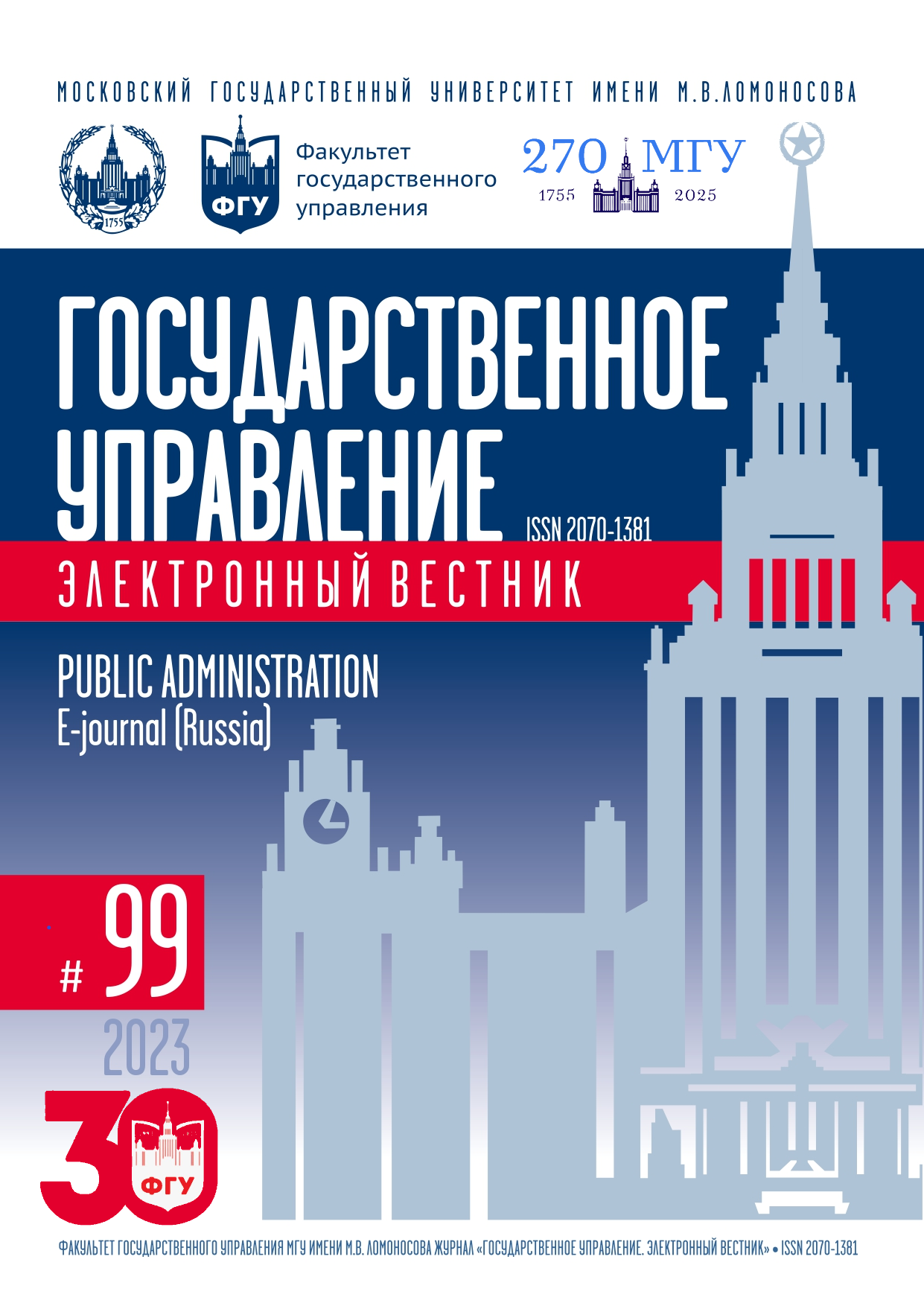Особенности трансформации сферы услуг в новой экономической реальности
Ключевые слова:
Цифровая трансформация, сфера услуг, сервисизация, меры поддержки, рейтинги, успешные практикиАннотация
В статье рассмотрены особенности цифровой трансформации сферы услуг в современных условиях. Актуальность данной темы обусловлена значимостью применения цифровых технологий для развития сферы услуг в обеспечении повышения уровня и качества жизни населения. Цель исследования — проанализировать процесс цифровой трансформации сферы услуг и показать направления ее дальнейшего развития. В работе использованы данные официальной статистики, выборочных наблюдений, экспертные оценки, методы группировок, сравнительного анализа. Новизна статьи состоит в том, что показано влияние неравенства уровней цифровой трансформации регионов как препятствие к достижению их цифрового суверенитета; трендом, дополняющим цифровую трансформацию сферы услуг, становится сервисизация производственного сектора, создающего собственные службы сервисного назначения; дифференциация уровней применения отдельных цифровых технологий в ведущих отраслях сферы услуг сдерживает развитие цифровой экономики в целом; трансформация взаимоотношений хозяйствующих субъектов ведет к развитию партнерских отношений, появлению реляционных услуг, становлению новых бизнес-моделей, таких как экосистемы, маркетплейсы; во взаимоотношениях с потребителями цифровая трансформация непосредственно влияет на улучшение качества обслуживания. Особое внимание в статье уделено развитию форм поддержки цифровой трансформации компаний в сфере услуг в виде преференций при приобретении отечественного программного обеспечения, грантов, субсидий, консалтинга, использования рейтингов для поиска и отбора технологичных компаний для их последующего участия в приоритетных проектах. В статье обоснованы рекомендации по дальнейшей активизации процесса цифровой трансформации посредством разработки критериев технологических компаний в сфере услуг и соответствующих им форм финансово-кредитной, консалтинговой, обучающей и иной поддержки; преференций при переходе на отечественное программное обеспечение в рамках государственных целевых проектов; стимулирующих рейтингов по поиску и отбору наиболее технологически продвинутых компаний как инструментов распространения успешных практик; применительно к малому и среднему бизнесу предлагается использовать понятие «малая технологическая компания» для усиления мер поддержки на региональном и местном уровнях.
Библиографические ссылки
Асхабалиев И.Ч. Региональные аспекты доступности платных услуг населению // АНИ: экономика и управление. 2017. Т. 6. № 2(19). С. 25–29.
Восколович Н.А. Междисциплинарный подход в оценке развития современной сферы услуг // Вестник Московского университета. Серия 6: Экономика. 2019a. № 5. С. 80–91.
Восколович Н.А. Измерение влияния цифровой трансформации сферы услуг на качество жизни населения // Государственное управление. Электронный вестник. 2019b. № 75. С. 6–23. DOI: 10.24411/2070-1381-2019-00001
Гаджиева А.Г. Цифровизация и занятость: роль отраслей сферы услуг // Инновации. 2018. № 2(232). С. 61–70.
Головцева И.Г., Сучкова М.Ю. Цифровая трансформация сферы услуг в новых условиях // Технико-технологические проблемы сервиса. 2020. № 4(54). С. 81–86.
Горбашко Е.А., Ватолкина Н.Ш. Тенденции развития сфер услуг в условиях цифровой трансформации экономики // Технико-технологические проблемы сервиса. 2019. № 3(49). С. 45–51.
Гусева А.Н. Сравнительный анализ состояния и проблем развития сферы услуг России и ее регионах // Научно-технические ведомости. 2011. № 3(125). С. 78–86.
Леонтьева Л.С., Кудина М.В., Воронов А.С., Сергеев С.С. Формирование национального цифрового суверенитета в условиях пространственного дифференцированного развития // Государственное управление. Электронный вестник. 2021. № 84. С. 277–299. DOI: 10.24412/2070-1381-2021-84-277-299
Нежельченко Е.В., Ясенок С.Н., Золоторева О.И., Герасимова Н.А. Диагностика влияния развития сферы услуг на качество жизни населения (на материалах регионов Центрального федерального округа) // Региональная экономика и управление. Электронный научный журнал. 2022. № 2(70). DOI: 10.24412/1999-2645-2022-270-12
Сидоров А.А. Развитие сферы услуг в условиях цифровой трансформации национальной экономики // Теоретическая и прикладная экономика. 2021. № 1. С. 39–47. DOI: 10.25136/2409-8647.2021.1.35316
Chin H., Marasini D.P., Lee D. Digital Transformation Trends in Service Industries // Service Business. 2023. Vol. 17. P. 11–36.
DOI: 10.1007/s11628-022-00516-6
Kamalaldin A., Linde L., Sjödin D., Parida V. Transforming Provider-Customer Relationships in Servitization: A Relational View on Digitalization // Industrial Marketing Management. 2020. Vol. 89. P. 306–325. DOI: 10.1016/j.indmarman.2020.02.004
Загрузки
Опубликован
Наиболее читаемые статьи этого автора (авторов)
- Восколович Нина Александровна, Ресмятова Антонина Сергеевна, Международное сотрудничество как драйвер развития въездного туризма в Россию из Китая , Государственное управление. Электронный вестник: № 95 (2022)
Похожие статьи
- Кононкова Наталья Петровна, Костанян Ани Асканазовна, Михайленко Диана Александровна, Новиков Владимир Александрович, Волкова Елена Юрьевна, Ильин-Минкевич Владислав Игоревич, Роль государства в совершенствовании интернет-инфраструктуры в вузах для поддержки комбинированных форматов обучения , Государственное управление. Электронный вестник: № 92 (2022)
- Юдина Мария Александровна, Цифровой контроль труда — вызов времени , Государственное управление. Электронный вестник: № 92 (2022)
- Чжан Цзяньхуа, Исследование инноваций в условиях цифровой трансформации обрабатывающей промышленности России и Китая в эпоху цифровой экономики , Государственное управление. Электронный вестник: № 110 (2025)
- Резниченко Сергей Анатольевич, Гавришев Алексей Андреевич, Государственная система поддержки деятельности российских СМИ по продвижению их продукции на зарубежные информационные рынки в условиях информационных войн , Государственное управление. Электронный вестник: № 96 (2023)
- Кулькова Варвара Юрьевна, Некоммерческие организации в предоставлении услуг в сфере здравоохранения на государственном и региональном уровнях , Государственное управление. Электронный вестник: № 95 (2022)
- Сидорова Александра Александровна, Система поддержки сотрудничества университетов и бизнеса в условиях глобальной нестабильности , Государственное управление. Электронный вестник: № 86 (2021)
- Орлов Андрей Евгеньевич, Чаадаев Виталий Константинович, Опережающее развитие здравоохранения на основе цифровой трансформации , Государственное управление. Электронный вестник: № 113 (2025)
- Рябинина Анна Михайловна, Экспорт образовательных услуг на мировом рынке образования , Государственное управление. Электронный вестник: № 85 (2021)
- Перетятько Полина Олеговна, Андреев Павел Андреевич, Назаренко Оксана Анатольевна, Оценка эффектов прямой государственной поддержки хозяйствующих субъектов Дальнего Востока на примере сельского хозяйства , Государственное управление. Электронный вестник: № 111 (2025)
- Лапидус Лариса Владимировна, Роль технологических инноваций в развитии бизнеса и цифровой трансформации в странах Евразийского экономического союза , Государственное управление. Электронный вестник: № 95 (2022)
Вы также можете начать расширеннвй поиск похожих статей для этой статьи.




